Apolis Activism
Perhaps you've heard the altruistic story of the brothers Parton. Five years ago, Raan, Shea and Stenn launched Apolis Activism hoping that they could make a impact—not just in the fashion industry, but in small parts of the world all too often forgotten. The label's look, timeless Americana by way of the beach, pays homage to their childhood. They grew up in Santa Barbara, but their father insisted on teaching them compassion by traveling to the likes of India, Africa and Cambodia. "His reasoning was that we'd never understand how good we had it if we didn't see it in person," says Shea. Their goal with the label has been to create high quality pieces utilizing textiles from developing economies. "Giving a percent of proceeds, that's easy," says Raan. "We're looking for opportunities that offer a long-term solution." Their biggest and most successful opportunity thus far has been a simple canvas briefcase. A collaboration with Filson, it was crafted with cotton grown and manufactured in Uganda. The initial release sold out so quickly, that they've decided to do a second run that will be released on December 9th. This is how that project came to be, the results from the collective efforts and and what's to come for Apolis Activism. Because despite the early success, the brothers are the first to tell you, this is just the beginning.
Philanthropist Briefcase, $396 (with free shipping)
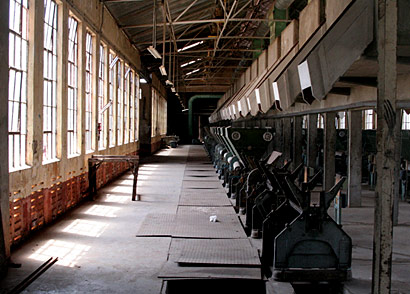
"Early last year, our friend Ben Thomas, VP of International Development for Invisible Children, showed us this canvas and we thought, 'This is great, let's make a jacket,'" Shea remembers. "But we knew it could be so much more, so we decided to reach out to Filson."

The result of the Ugandan cotton after being harvested and spun, then woven and dyed at a local plant (seen at left). Softer and lighter than that of a regular Filson bag, it's perfect for city living.

The average time for the canvas to get from Jinja, Uganda to the Apolis Activism studio in downtown LA.

Number of workbenches each bag passes through at Filson's Seattle factory, from sewing on the handle to setting the inside pockets.
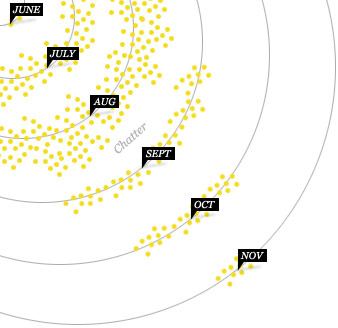
- Ben Thompson, Invisible Children
Chatter about the bag blew up on the blogosphere and by the time it was released in August, every location sold out immediately. The Uganda Project has thus far utilized three farmers' entire annual yield of cotton crops. "They're small but powerful steps in getting this cotton initiative off the ground," says Raan. "But the initial response was so encouraging ... that's why we decided to do another run this winter."
The total number of bags produced. Two separate runs of 200 individually numbered bags.
Approximate total weight of cotton exported. Uganda's cotton exports had been decreasing since the 1970s because of the country's civil war. This not only boosted the industry, but built a supply chain from farmer to manufacturer.
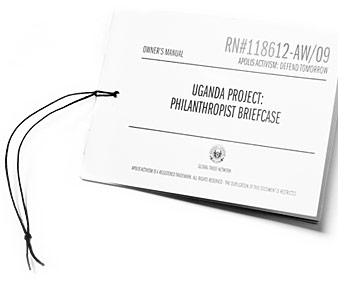
Apolis Activism will continue to work with the growers in Uganada. For their Spring 2010 collection, they've produced a canvas tote—a design all their own. "We still have a great relationship with Filson and we hope to be working together in the future," says Shea. "We were just looking for something a little simpler for spring." In addition to the Uganda project, the label is also has initiatives in Nepal and Ecuador.
Made from the same canvas, but dyed an army green, the simple zippered tote features hand painted cow hide leather from Ecuador.
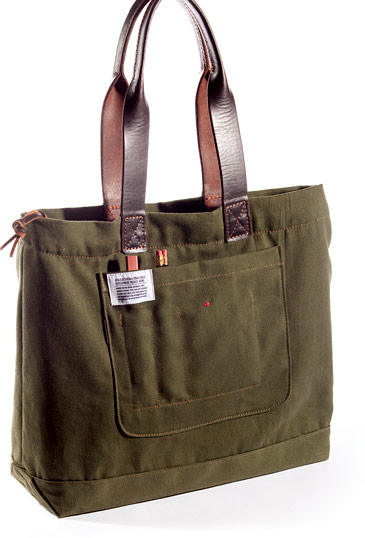
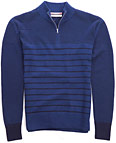
The non-profit Citta began a women's cashmere cooperative in Kathmandu, Nepal that creates the wool for a sweater produced in collaboration with British cycling company Rapha. Over the past three months, the project as provided work for 35 seamstresses.
A tannery in the small town of Quisapincha, Ecuador employs a majority of the local community. After learning about the country's 30% poverty rate, the label partnered with the tannery to produce a set of "officer" and "civilian" belts 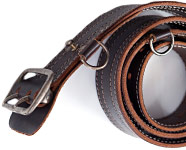 from hand painted cow hide leather and finished with vintage hardware.
from hand painted cow hide leather and finished with vintage hardware.
Comment
© Copyright 2024 Degitao Technology Pvt. Ltd - All Rights Reserved. | Privacy Policy | Terms & Conditions